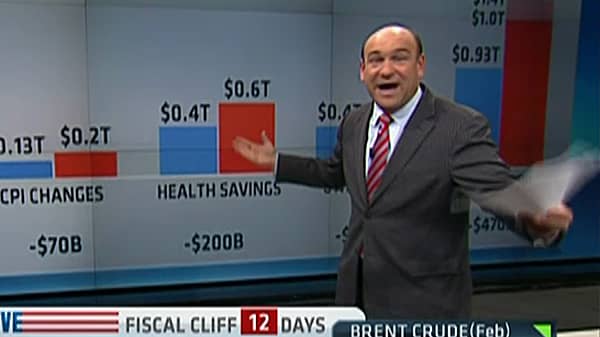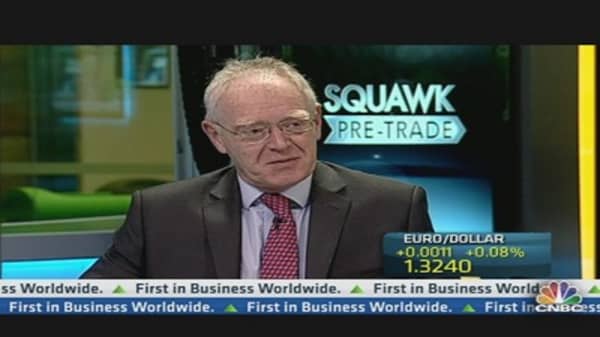Stocks ended near session lows Wednesday, wiping out much of the previous session's rally, as negotiations to avert the looming "fiscal cliff" turned sour after Speaker John Boehner said the House of Representatives will pass a budget proposal that President Barack Obama had already threatened to veto.
The Dow Jones Industrial Average fell 98.99 points, or 0.74 percent, to close at 13,251.97, pulling back after posting its second triple-digit rally in the previous session. General Electric and Alcoa led the blue-chip laggards.
The S&P 500 dropped 10.98 points, or 0.76 percent, to finish at 1,435.81. The Nasdaq declined 10.17 points, or 0.33 percent, to end at 3,044.36. The CBOE Volatility Index (VIX), widely considered the best gauge of fear in the market, jumped above 17.
All key S&P sectors closed in the red, led by consumer staples and health care.
"I wouldn't be surprised to see a hard selloff after a deal is reached—sell the news," said Harry Clark, chairman and CEO of Clark Capital Management. "We're in a high-risk area—everyone's most confused than ever and the public is out of the market totally."
Boehner pressed his "Plan B" proposal that would extend the Bush-era tax cuts for those earnings up to $1 million, despite Obama's veto threat, saying it will be approved Thursday by the GOP-controlled House.
"Then the president will have a decision to make," said Boehner. "He can call on the Senate Democrats to pass that bill, or he can be responsible for the largest tax increase in American history." (Read More: Early Santa Rally? If Congress Doesn't Mess Up)
Meanwhile, Obama said the two sides were only $200 billion apart in a deal to avoid the looming "fiscal cliff," and he's ready to get the job done.
"If you look at Speaker Boehner's proposal and my proposal, they're pretty close. They're the same categories with a few differences, but we're right there," said Obama. "This is not a situation where I'm unwilling to compromise and anyone who looks at this objectively would say that I have met [the Republicans] at least halfway." (Read More: 'Cliff' Deal: How Close Are They?)
Adding to jitters, ratings agency Fitch warned that the U.S. could lose its triple-A status if Washington does not solve the "fiscal cliff" issue. The agency current has a negative outlook on its U.S. sovereign rating, while Standard & Poor's cut its triple-A status on the U.S. last August.
Herbalife plunged more than 12 percent after widely-followed hedge fund manager William Ackman said he is shorting the nutrition and skin-care products company's stock and has told people he considers the business to be little more than a "pyramid scheme." Ackman is expected to explain his reasons for the move at an investment conference Thursday. (Watch: Herbalife CEO: 'This Is a Legitimate Company')
General Motors jumped after the automaker said it will buy back 200 million of its own shares from the Treasury for $27.50 a share over the next 15 months.
Among earnings, Oracle rallied after the computer hardware company beat earnings forecasts and handed in current-quarter profit guidance that matched expectations. In addition, at least 12 brokerages lifted their price target on the company.
FedEx edged higher after the package-delivery company posted earnings that dropped less than expected.
General Mills posted earnings that topped expectations and lifted its full-year profit outlook, but the food processing company reversed its initial gains to finish lower.
Accenture and Bed Bath & Beyond are among notable companies scheduled to report earnings after the closing bell.
Knight Capital jumped after the market maker agreed to be acquired by Getco in deal valued at nearly $1.4 billion.
General Electric declined after UBS removed the conglomerate from its "key call" list, citing likelihood of weak near-term earnings due to the uncertain macro environment. GE is the minority shareholder of NBCUniversal.
On the economic front, housing starts dropped to a seasonally adjusted annual rate of 861,000 in November, three percent lower than the month prior, according to the Commerce Department. Super storm Sandy likely slowed starts in the Northeast. Economists polled by Reuters expected permits to rise to an 875,000-unit pace last month.
Weekly mortgage applications fell to their lowest level since early November last week, snapping a five-week gain, according to the Mortgage Bankers Association.
Treasurys pared gains after the government auctioned $29 billion in 7-year notes at a high yield of 1.233 percent. The bid-to-cover was 2.72.
European shares ended higher after investors cheered a strong business confidence report from Germany and after Standard and Poor's boosted Greece's credit rating to a B-minus with a "stable" outlook.
—By CNBC's JeeYeon Park (Follow JeeYeon on Twitter: @JeeYeonParkCNBC)
Coming Up This Week:
THURSDAY: GDP, jobless claims, corporate profits, existing home sales, Philadelphia Fed survey, FHFA home price index, leading indicators, Fed balance sheet/money supply, UPS busiest day; Earnings froM CarMax, ConAgra, Darden Restaurants, Discover Financial, Rite Aid, Nike, RIMM, Micron
FRIDAY: Quadruple witching, personal income & outlays, Chicago Fed activity index, consumer sentiment, BLS state employment stats; Earnings from Walgreen
More From CNBC.com:





